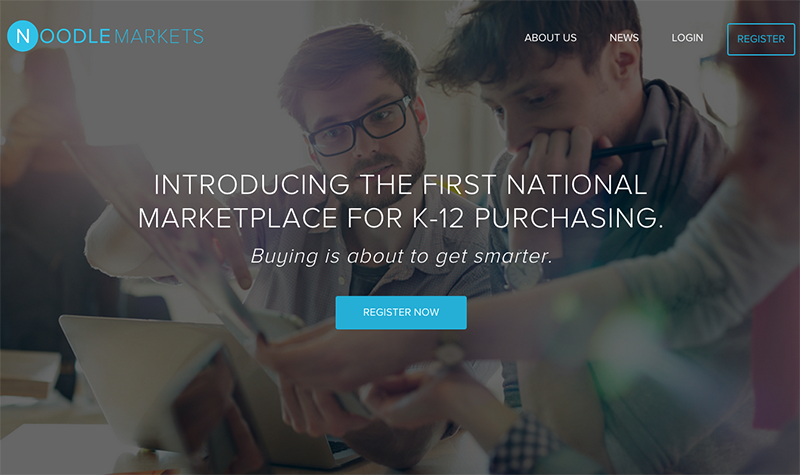
Noodle Markets will open to schools in the coming months and hopes to change the way products are found and purchased.
Any assessment of why schools have been slow to adopt new technology and use games in the classroom always focuses in part on the problem of discoverability and purchasing. A new tool, backed by an array of investors and boasting a team of experts are planning on fixing that with a new service called Noodle Markets.
Noodle Markets promises to do something no one up until now has been able to create, namely, “a one-stop source of comprehensive information about the vast array of paid and free educational tools, making the discovery and selection process easier for educators while also leveling the playing field for vendors.”
If it works, this would allow learning game developers to put their apps and tools in front of teachers and centralize the challenges of finding tools and recommending other games, a task the App Store, Google Play and Edmodo have all struggled to accomplish.
To pull this off, John Katzman, the entrepreneur who previously founded The Princeton Review and 2U, has tapped Nicole Neal, a veteran of Pearson and a 300-person team that oversaw assessment and innovation at Education Solutions Group at CORE Education Consulting and Solutions, to make Noodle Markets work.
Neal told gamesandlearning.org that now is the time for a service like the marketplace, noting, “It is tremendously challenging and costly for vendors to connect with new prospective K-12 customers, and the cost of education sales and marketing ultimately drives up prices in the education materials market. New suppliers struggle the most with these realities. We believe that our purchasing solutions help level the playing field for vendors, making it easier for the best products – new and old – to find a market.”
She was quick to add that, “K-12 vendors can currently add their products and services to Noodle Markets free of charge. In recent weeks, we have seen a number of game-based learning / gamified learning products register, and we hope to see many others join before we open our doors to K-12 educators in the months to come.”
The marketplace is looking for companies to submit their products to the service set to open up to educators in the next month or two, but they had had no trouble finding investors who see Noodle Markets as a possible breakthrough in the school space. Just last week, the company announced the conclusion of a $3 million seed financing round, with well-known investor Rick Segal and his Rethink Education leading the effort. Segal noted that, “Challenges around K-12 procurement have persisted for decades, and no one has thought of a creative way to address them. We believe that the innovative solutions developed by Noodle Markets will add transparency, remove friction, and make K-12 purchasing easier. This is an absolute necessity in a market that is becoming increasingly complex.”
We plan on taking a deeper dive into Noodle Markets in the coming weeks to explore the service and its pros and cons for developers, but before we do that we asked Nicole Neal a few more questions about Noodle Markets and how this project hopes to crack the nut of school purchasing and discovery.
Gamesandlearning.or: Why do you think no marketplace like Noodle Markets has been developed already?

Noodle Markets chief Nicole Neal
Nicole Neal: I believe there are three primary reasons why Noodle Markets is the first marketplace of its kind. First, no one has wanted to tackle the K-12 procurement problem because it’s hard and it’s not sexy. It can be complicated and is steeped deeply in a set of rules and regulations that have persisted for a very, very long time.
Second, the materials market has evolved rapidly, placing new pressures on education buyers. We have seen an explosion in the number of products in the K-12 market, including growth in the exciting game-based learning / gamified learning categories. Educators are busy with the important work of helping students, and they don’t have time to keep up with the latest technologies and initiatives, funding, and legal and regulatory changes. As a result, they recognize the increasing need to have a trusted source for this information.
Third, technological advances allow us to build comprehensive search engines and to create digital workflows that consider multiple touch points. Additionally, the increased movement towards social and market networks that coordinate transactions among multiple buyers and sellers enables Noodle Markets to be well positioned to solve the K-12 purchasing problem in a meaningful way that we could not have done five years ago.
…
We are at an inflection point in education. Never before has there been such a heightened awareness of the importance of moving the needle in the classroom, tied with accountability and evaluation; the passing of the Every Student Succeeds Act [ESSA] and other important shifts underscore this. K-12 purchasers understand that the decisions they make, i.e., choosing the right products that meet student needs, have a direct impact on student achievement. Thus solutions that help ensure that precious dollars are spent wisely can be invaluable to K-12 leaders.
Gamesandlearning.org: What experiences from Pearson and your previous work has helped inform the development of Noodle Markets?
Nicole Neal: My experiences at Pearson and my other previous work definitely helped inform the development of Noodle Markets. Prior to having the opportunity to co-found Noodle Markets with John Katzman, I served as the President of the US Division for CORE Education and Consulting (CORE ECS), was Senior Vice President of Major Accounts and State Services at Pearson Education, and served as the Senior Vice President of Client Services for Schoolnet. My passion for education and my computer engineering background were a perfect match for supporting these education technology companies.
There are two experiences that probably prepared me the most. At Schoolnet, I had first-hand knowledge about how difficult it was to get a great product into an educator’s hands. The company was ahead of its time and struggled in the earlier years to gain traction in the market. Throughout my time at Pearson, CORE ECS, and Schoolnet, I was on the frontline. Serving as the executive liaison and point of escalation to the Superintendents, State officials, C-level leadership, and Executive Directors allowed me to truly understand educator needs and, most importantly, their pain points.
As we began building the Noodle Markets solution, we studied their purchasing behaviors and spent a great deal of time interviewing them. Educators are constantly approached by vendors and are often asked to make important decisions about products and services with less than optimal information and little to no evidence of its effectiveness in the classroom. When K-12 purchasers are ready to buy something that requires competitive bidding, they are often faced with extremely long durations between RFP issuance and contract award due to issues ranging from the number of approvals needed to the sometimes hard to understand procurement rules and regulations. Noodle Markets was developed based on the culmination of years of K-12 experience, an undying passion for education, a strong eye towards innovation, and a belief that as “change makers” we can and will make purchasing easier.
Gamesandlearning.org: What have you heard from funders is the thing that sold them on the potential of Noodle Markets?
Nicole Neal: Investors were sold on Noodle Markets’ potential because, while K-12 procurement may not be sexy, it is critically important, and a lot of money is spent on it. According to the National Education Association’s research report, Rankings of the States 2013 and Estimates of School Statistics 2014, $640 billion was spent on K-12 education in 2014. Of the $640 billion, $128 billion was spent on K-12 public school expenditures, including textbooks, supplies, operations/maintenance, technology, instructional services, transportation, food services, construction, and other purchases. Salaries, benefits, capital outlay, and interest paid on debt are excluded from that figure.
There’s a lot of money in education; however, there is also a lot of waste and inefficiency. It’s no secret that K-12 procurement processes are incredibly time-intensive for districts and vendors alike. Educators openly admit to lacking confidence that they can see all available options before they purchase. Noodle Markets helps school districts streamline complicated purchasing processes and expands the universe of vendors bidding on RFPs by providing a one-stop source of comprehensive information about the vast array of paid and free educational tools.
Bottom line, we make the discovery and selection process easier for educators, while also leveling the playing field for vendors.
No one in the market is approaching K-12 purchasing quite like Noodle Markets. If we address some of these issues while making money in a multi-billion dollar market, it’s a no brainer. Investors love it.
